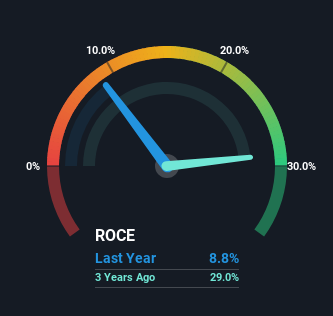Returns On Capital At Yantai Ishikawa Sealing Technology (SZSE:301020) Paint A Concerning Picture

If you're not sure where to start when looking for the next multi-bagger, there are a few key trends you should keep an eye out for. Amongst other things, we'll want to see two things; firstly, a growing return on capital employed (ROCE) and secondly, an expansion in the company's amount of capital employed. If you see this, it typically means it's a company with a great business model and plenty of profitable reinvestment opportunities. Although, when we looked at Yantai Ishikawa Sealing Technology (SZSE:301020), it didn't seem to tick all of these boxes.
Understanding Return On Capital Employed (ROCE)
Just to clarify if you're unsure, ROCE is a metric for evaluating how much pre-tax income (in percentage terms) a company earns on the capital invested in its business. Analysts use this formula to calculate it for Yantai Ishikawa Sealing Technology:
Return on Capital Employed = Earnings Before Interest and Tax (EBIT) ÷ (Total Assets - Current Liabilities)
0.088 = CN¥82m ÷ (CN¥1.1b - CN¥197m) (Based on the trailing twelve months to December 2023).
So, Yantai Ishikawa Sealing Technology has an ROCE of 8.8%. On its own that's a low return, but compared to the average of 5.7% generated by the Chemicals industry, it's much better.
Check out our latest analysis for Yantai Ishikawa Sealing Technology

Historical performance is a great place to start when researching a stock so above you can see the gauge for Yantai Ishikawa Sealing Technology's ROCE against it's prior returns. If you'd like to look at how Yantai Ishikawa Sealing Technology has performed in the past in other metrics, you can view this free graph of Yantai Ishikawa Sealing Technology's past earnings, revenue and cash flow.
How Are Returns Trending?
In terms of Yantai Ishikawa Sealing Technology's historical ROCE movements, the trend isn't fantastic. Around five years ago the returns on capital were 36%, but since then they've fallen to 8.8%. However, given capital employed and revenue have both increased it appears that the business is currently pursuing growth, at the consequence of short term returns. If these investments prove successful, this can bode very well for long term stock performance.
On a related note, Yantai Ishikawa Sealing Technology has decreased its current liabilities to 18% of total assets. That could partly explain why the ROCE has dropped. Effectively this means their suppliers or short-term creditors are funding less of the business, which reduces some elements of risk. Some would claim this reduces the business' efficiency at generating ROCE since it is now funding more of the operations with its own money.
Our Take On Yantai Ishikawa Sealing Technology's ROCE
While returns have fallen for Yantai Ishikawa Sealing Technology in recent times, we're encouraged to see that sales are growing and that the business is reinvesting in its operations. However, total returns to shareholders over the last year have been flat, which could indicate these growth trends potentially aren't accounted for yet by investors. As a result, we'd recommend researching this stock further to uncover what other fundamentals of the business can show us.
If you want to know some of the risks facing Yantai Ishikawa Sealing Technology we've found 3 warning signs (2 are significant!) that you should be aware of before investing here.
While Yantai Ishikawa Sealing Technology may not currently earn the highest returns, we've compiled a list of companies that currently earn more than 25% return on equity. Check out this free list here.
New: Manage All Your Stock Portfolios in One Place
We've created the ultimate portfolio companion for stock investors, and it's free.
• Connect an unlimited number of Portfolios and see your total in one currency
• Be alerted to new Warning Signs or Risks via email or mobile
• Track the Fair Value of your stocks
Have feedback on this article? Concerned about the content? Get in touch with us directly. Alternatively, email editorial-team (at) simplywallst.com.
This article by Simply Wall St is general in nature. We provide commentary based on historical data and analyst forecasts only using an unbiased methodology and our articles are not intended to be financial advice. It does not constitute a recommendation to buy or sell any stock, and does not take account of your objectives, or your financial situation. We aim to bring you long-term focused analysis driven by fundamental data. Note that our analysis may not factor in the latest price-sensitive company announcements or qualitative material. Simply Wall St has no position in any stocks mentioned.
About SZSE:301020
Yantai Ishikawa Sealing Technology
Yantai Ishikawa Sealing Technology Co., Ltd.
Flawless balance sheet with acceptable track record.
Market Insights
Community Narratives



